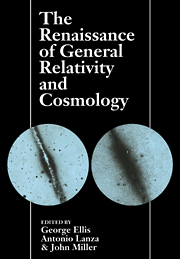 The Renaissance of General Relativity and Cosmology
The Renaissance of General Relativity and Cosmology Book contents
- Frontmatter
- Contents
- Author Addresses
- 1 Introduction
- 2 Exact and inexact solutions of the Einstein field equations
- 3 Inertial forces in general relativity
- 4 Relativistic radiation hydrodynamics: a covariant theory of flux-limiters
- 5 Relativistic gravitational collapse
- 6 The cosmic censorship hypothesis
- 7 The Kerr metric: a gateway to the roots of gravity?
- 8 Galactic astronomy since 1950
- 9 Galaxy distribution functions
- 10 Nonlinear galaxy clustering
- 11 Quasars: progress and prospects
- 12 Decaying neutrinos in astronomy and cosmology
- 13 Cosmological principles
- 14 Anisotropic and inhomogeneous cosmologies
- 15 Mach's principle and isotropic singularities
- 16 Implications of superconductivity in cosmic string theory
- 17 The formation and evaporation of primordial black holes
- 18 Evaporation of two dimensional black holes
- 19 Topology and topology change in general relativity
- 20 Decoherence of the cluttered quantum vacuum
- 21 Quantum non-locality and complex reality
- 22 The different levels of connections between science and objective reality
20 - Decoherence of the cluttered quantum vacuum
Published online by Cambridge University Press: 15 December 2009
- Frontmatter
- Contents
- Author Addresses
- 1 Introduction
- 2 Exact and inexact solutions of the Einstein field equations
- 3 Inertial forces in general relativity
- 4 Relativistic radiation hydrodynamics: a covariant theory of flux-limiters
- 5 Relativistic gravitational collapse
- 6 The cosmic censorship hypothesis
- 7 The Kerr metric: a gateway to the roots of gravity?
- 8 Galactic astronomy since 1950
- 9 Galaxy distribution functions
- 10 Nonlinear galaxy clustering
- 11 Quasars: progress and prospects
- 12 Decaying neutrinos in astronomy and cosmology
- 13 Cosmological principles
- 14 Anisotropic and inhomogeneous cosmologies
- 15 Mach's principle and isotropic singularities
- 16 Implications of superconductivity in cosmic string theory
- 17 The formation and evaporation of primordial black holes
- 18 Evaporation of two dimensional black holes
- 19 Topology and topology change in general relativity
- 20 Decoherence of the cluttered quantum vacuum
- 21 Quantum non-locality and complex reality
- 22 The different levels of connections between science and objective reality
Summary
We review the properties of the cluttered Minkowski vacuum. In particular we discuss the example of a uniformly accelerated quantum oscillator in the Minkowski vacuum showing that it does not radiate. Equivalently, the presence of the oscillator does not lead to decoherence (i.e. the emergence of classical probabilities). Mach's Principle was related originally by Einstein to the non-existence of (classical) vacuum cosmological models. We speculate that Mach's Principle may acquire a quantum role as a condition for decoherence of the universe.
INTRODUCTION
Following Hawking's announcement (Hawking 1974,1975) of his result that black holes radiate a thermal flux, Davies (1975) applied an analogous technique to the spacetime of a uniformly accelerated observer in the Minkowski vacuum in the presence of a reflecting wall. He interpreted the result as a flux of radiation from the wall at a temperature ha/4π2ck, where a is the acceleration of the observer. Unruh (1976) independently showed that the Minkowski vacuum appears as a thermal state to any uniformly accelerated detector, the normal modes of which were defined with respect to its own proper time. There is no flux from the horizon but the detector is raised to an excited state with its levels populated according to a Boltzmann distribution at a temperature ha/4π2ck as it would be in an inertial radiation bath at this temperature.
- Type
- Chapter
- Information
- The Renaissance of General Relativity and CosmologyA Survey to Celebrate the 65th Birthday of Dennis Sciama, pp. 300 - 313Publisher: Cambridge University PressPrint publication year: 1993


